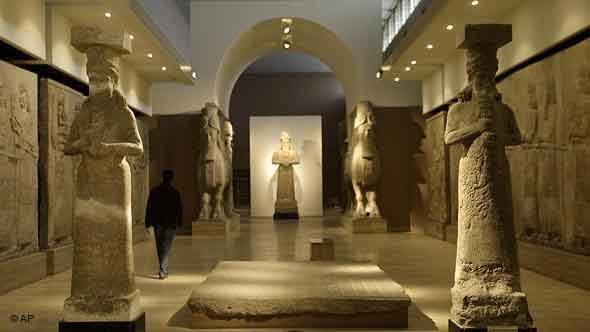Dar Al-Iftaa condemns the destruction of ancient Assyrian artifacts and statues at Mosul Museum

Egypt’s Dar Al-Iftaa strongly condemned the destruction of ancient Assyrian artifacts and statues at Mousl museum in Nineveh Governorate, Iraq.
In a statement, Dar Al-Iftaa emphasized that the deviant opinions adopted by QSIS on the destruction of monuments are weak, misleading and legally unfounded. This is especially so since the Companions did not order the destruction of the monuments they found in the countries they entered but preserved them. The honorable Companions were chronologically closer to the Messenger of God than they are to us. Some of them came to Egypt during its conquest and did not issue any fatwa or legal opinion allowing any assault on the priceless historical monuments they found. It is reported that the noble companions prayed in the premise of the Pyramids and stated that it is the prayer place for earlier prophets.
The statement added that the historical value of those monuments is of a particular influence on the life of the society and nation because they represent their history and values and because they comprise lessons from previous nations. Consequently, whoever dares to destroy an ancient artifact or calls for the destruction of monuments under the pretext of religious prohibition expresses extremist inclinations aberrant from the true teachings of Islam.
The statement expressed the necessity of preserving the priceless material treasures of human civilization, some of which belong to the Islamic era and others to the civilization of previous nations. It stressed that preserving this heritage and visiting such sites is both lawful and encouraged by religion due to the lessons which can be derived from the civilizations of the previous nations.
In its refutation of the deviant fatwas QSIS resorts to, Dar Al-Iftaa said that there are numerous Quranic verses and Prophetic traditions prohibiting the destruction of any ancestral heritage. These include: “Have you not considered how your Lord dealt with 'Aad. [With] Iram - who had lofty pillars. The likes of whom had never been created in the land? And [with] Thamud, who carved out the rocks in the valley?” [89: 6-9] and the Prophetic tradition forbidding the destruction of the forts of Medinah.
In its statement, Dar Al-Iftaa pointed out that Muslims preserved the civilizational heritage and monuments of Egypt, Mesopotamia and the other civilizations that preceded Islam.
Dar Al-Iftaa refuted the extremist opinion claiming the prohibition of preserving those monuments because, according to them, they lead to idol worship and because the masses may believe in the blessings of those places. Dar Al-Iftaa pointed out the invalidity of such claims because Islamic law does not generally prohibit venerating other than God. Islamic law only prohibits the veneration of other than God as a matter of worship similar to what the people in the pre-Islamic era used to do.
In its response, Dar Al-Iftaa added that those extremists do not understand the concept of shirk [associating partners with God]. It explained that shirk means glorifying entities alongside God or to His exclusion. It was for this reason that the angels’ prostration to Adam [peace be upon him] was an act of belief and monotheism while the polytheists’ prostration to the idols was an act of disbelief and shirk in spite of the fact that in both cases, the prostration was to created beings. However, the angels’ prostration to Adam [peace be upon him] was out of venerating what God has venerated and in compliance to His command and, as such, it was both permissible and rewardable. On the other hand, the polytheists’ prostration to their idols was by way of the veneration that is due only to God the Almighty and is therefore considered shirk.
Dar Al-Iftaa called upon the concerned countries and organizations to take all the necessary measures to stop any aggression against or destruction of any cultural heritage and stressed the necessity of preserving cultural heritage according to the established principles and policies ratified by international and Islamic treaties.
Dar Al-Iftaa also called upon religious scholars, mosque imams and priests to rise up to the responsibility of raising people’s awareness of the necessity of preserving their cultural heritage and countering deviant fatwas calling for the destruction of monuments. It also stressed the importance of enacting laws to guarantee the preservation of cultural heritage.
 Arabic
Arabic French
French Deutsch
Deutsch Urdu
Urdu Pashto
Pashto Swahili
Swahili Hausa
Hausa
